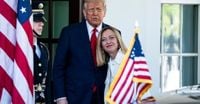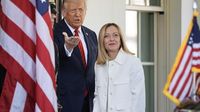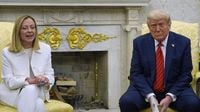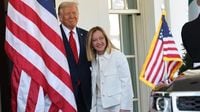President Donald Trump and Italian Premier Giorgia Meloni met on Thursday, April 17, 2025, in Washington, where Trump expressed that he is in "no rush" to finalize trade deals, citing the revenue generated from existing tariffs. This meeting marked Meloni as the first European leader to engage in face-to-face talks with Trump since he announced a partial suspension of a 20% tariff on European exports.
During their discussions, Trump hinted at the ease of reaching agreements with the European Union and other nations, stating, "We’re in no rush" and suggesting that many countries are eager to negotiate with the U.S. He emphasized that these countries desire access to American consumers, giving him leverage in trade negotiations.
Meloni's visit was seen as a critical test of her role as a bridge between the U.S. and the EU, particularly amid increasing tensions over trade and national security. She emphasized the importance of collaboration, stating, "The goal for me is to make the West great again," a sentiment that aligns with Trump’s agenda.
Trade between the EU and the U.S. is substantial, with annual figures reaching 1.6 trillion euros ($1.8 trillion). The Trump administration has argued that tariffs are necessary to facilitate negotiations that could potentially exclude China, the world’s leading manufacturer. Trump pointed to declining prices for gasoline and eggs as evidence that tariffs are not harming the economy, despite concerns that they may lead to broader inflationary pressures.
In a nod to the ongoing negotiations, Trump has paused the initial 20% tax on EU products for 90 days to allow discussions to unfold. Meanwhile, Maroš Šefčovič, the European Commissioner for Trade, met with U.S. officials earlier this week, indicating a commitment to finding common ground on tariffs and trade barriers.
Meloni, who has been a vocal supporter of Ukraine in its conflict with Russia, was expected to discuss Italy’s defense spending, which currently stands at 1.49% of GDP, below NATO's target of 2%. Trump has urged NATO allies to increase their defense budgets and expressed a desire for Italy to meet its obligations.
Despite their ideological alignment on various issues, such as immigration and national security, stark differences remain, particularly regarding support for Ukraine. Meloni has consistently advocated for Ukraine, while Trump has expressed a more ambivalent stance, recently stating he does not blame Ukrainian President Volodymyr Zelensky for the war but also identifying as "not a fan" of him.
As the meeting progressed, Trump reiterated his optimism about securing a trade deal with Europe before the end of the 90-day tariff pause, asserting, "There’ll be a trade deal 100%." A senior administration official noted that the persistent trade deficit with EU members, including Italy, is a source of concern for Trump.
The backdrop of the meeting reflects the growing global uncertainty fueled by escalating tariff wars. Italy's growth forecast for this year has already been slashed from 1% to 0.5%, a direct consequence of the trade tensions.
Trump's administration has also been active in negotiations with other countries, including Japan, where he met with the chief trade negotiator earlier this week. As part of a broader strategy, Treasury Secretary Scott Bessent indicated that the administration is prioritizing trade discussions with the "big 15 economies" and that South Korean officials are set to visit Washington next week.
In light of the ongoing tariff disputes, Meloni's role is seen as pivotal for Italy and the broader EU. Experts suggest her ability to navigate these complex negotiations could yield significant benefits for both Italy and the trans-Atlantic relationship.
As the meeting concluded, Meloni expressed gratitude to Trump for his willingness to engage with Italy and the EU, emphasizing the need for open dialogue to address mutual concerns. She stated, "I believe in the West's unity and I think we have to talk and find ourselves in the best middle way to grow together." This sentiment underscores the delicate balance required to maintain strong ties amid rising tensions.
While the immediate outcomes of the meeting remain to be seen, it has set the stage for further dialogue between the U.S. and EU, highlighting the importance of cooperation in addressing shared challenges. The future of trans-Atlantic relations hinges on the ability of leaders like Meloni to bridge gaps and foster collaboration in an increasingly complex global landscape.







